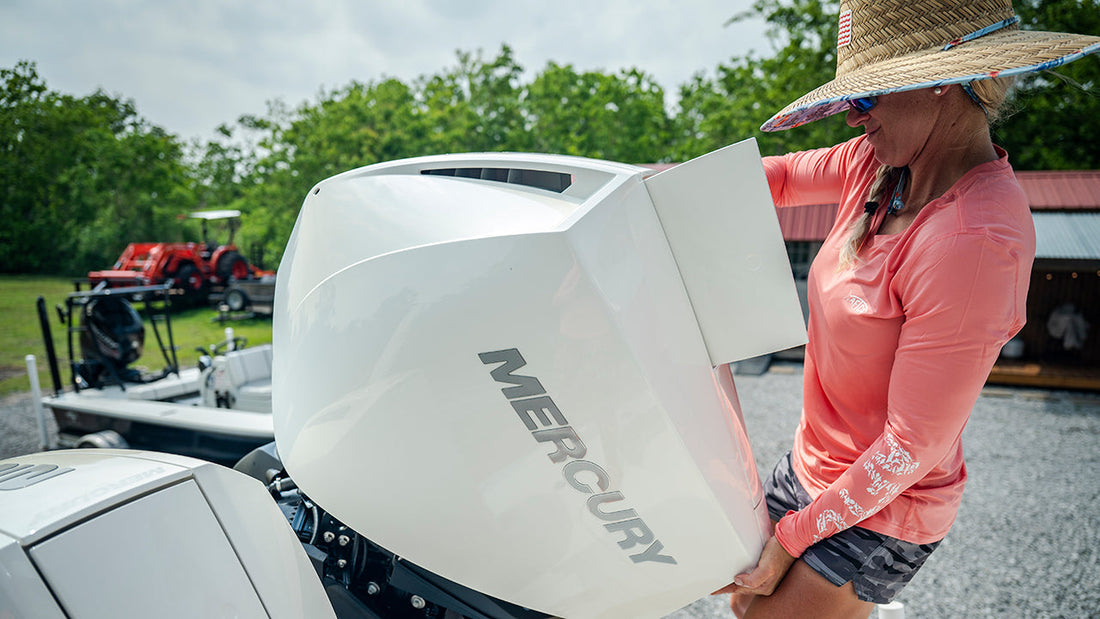
5 Tips for Daily Boat Maintenance
Detailing, fluid checks, and inspecting trailer hubs should be on your routine checklist for optimal boat performance. Captain Moe Newman from Journey South Outfitters shares five essential maintenance tips. Whether navigating freshwater or saltwater, these guidelines ensure proper boat care for an enjoyable time on the water.From detailing to checking fluids and trailer hubs, these daily boat checks help you get the most out of your boat and ensure top performance. Captain Moe Newman of Journey South Outfitters takes us through her five tips from her daily boat maintenance routine. From freshwater to saltwater, these tips will help you take care of your boat to enjoy your time on the water.
1. Check Your Oil
Boat engines need oil to operate, and marine oils are designed to protect the engine from corrosion, moisture, and strain. Checking the oil first depends on whether you have inboard or outboard engines. For outboard motors with a dipstick, start by pulling the dipstick out and wiping it clean with a towel, then put it back in to see the current oil level. Add oil as needed and refer to your owner's manual to see what grade and type of oil manufacturers recommend. If you're operating a boat with inboard motors, you'll need to start by lifting the engine hatch or hood and perform the same process. If you have multiple motors on your boat, make sure to check all of them.
Technicians recommend changing your boat's oil and gear lube every 100 hours or at least once a year. After checking the oil levels, inspect all your engine lines and hoses for wear and fuel leaks. If you see anything concerning, contact your local boat maintenance technician. By checking the oil before heading out, you can avoid damaging your engines and getting stranded on the water.

2. Check Under the Cowling
With the oil checked, it’s time to look under the cowling or hood. If your boat is saltwater-based with outboards, check for saltwater underneath the hood because saltwater corrodes metal almost ten times faster than freshwater. If you see saltwater under the hood, use freshwater to wipe it off, and then use an anti-corrosion spray like CRC to help protect all the components under the hood. For inboard saltwater boats, there should be little to no water inside your engine compartment, and make sure to soak it up with a towel right away to avoid corrosion.
If your boat is freshwater-based and has outboards, you don’t have to worry about intense corrosion. However, still make sure there’s no water under the cowling. For freshwater inboard boats, there will probably be a small amount of water inside the engine compartment, which is normal. If there is a lot of water, consult your marine mechanic, and don’t take your boat out until the issue is fixed. Also, check for any loose debris and remove it immediately. With your hood checked, you’re one step closer to hitting the water.

3. Check Your Bilge
The bilge is the lowest point on your boat and collects fluids and condensation from your engines. It’s normal to see a little fluid in your bilge, but there should not be an excessive amount of fluid or water present. If you notice fuel in your bilge, you could have a small leak or a more significant mechanical issue. Regardless, do not take your boat out if you see fuel in the bilge until it’s been mechanically inspected.
For larger boats with bilge pumps, it's important to inspect those, too, especially if your boat has multiple. It should be free of debris and each valve and screw should be tight. For electric bilge pumps, check the battery, and make sure it's fully functioning. Without proper maintenance and inspection, bilge pumps can deteriorate quickly, especially in harsh saltwater. Conditions can change quickly on the water, and in an emergency, bilge pumps can make all the difference.

4. Check Your Prop
The prop is the driving force of the engine. The first thing to check is that it spins smoothly forward and reverse. If you can't spin the prop in one direction, check the prop shaft because there's probably monofilament or braid stuck that's not letting the prop rotate. If there is a fishing line in the prop, it can eventually cut into the seal that keeps the lower unit oil inside, leading to a costly repair, so keep an eye out. After checking that, it's good practice to give the prop a strong pull back and forth to the point where the boat is shaking to check that your prop nuts are tight. This quick test will let you know if the prop nuts are loose and tighten them if needed.
As you're launching and about to take off, something else to be aware of is your dock lines. If you have inexperienced passengers on board, they could accidentally leave a line in the water that could end up in the prop if it goes unnoticed. If you get a rope in your prop, turn the engine off and remove it quickly. Otherwise, you can burn up your engine if the rope isn't letting the prop spin. If you're operating a center console with multiple outboards, it's not recommended to run it if one of the engines is out of commission. Doing so puts extra strain on the other engines, making them overcompensate.

5. Check Your Trailer Hubs
First and foremost, check your trailer hubs before each trip to ensure they’re tight and greased. The trailer hubs are paramount because they connect the tires to your trailer’s axle, which allows them to spin. If your trailer hubs corrode or come loose, the aftermath can be devastating because it can cause damage to the towing vehicle, the trailer, and whatever is on your trailer. Not to mention, if you’re driving down the highway, it can cause an accident, too.
After checking your trailer hubs, check the tire pressure, and always have a spare tire if one of yours goes flat. Also, have your toolset handy to easily change your tire without waiting for a roadside assistance service.

One last thing to keep in mind with boat trailer maintenance is washdowns. Whether you’re a freshwater or saltwater angler, your trailer takes a beating on the road. To keep it in top condition, you should wash it down regularly. If you’re a saltwater angler, corrosion is much more prominent, and you should wash it down with freshwater after each trip.
For experienced anglers and boaters, these maintenance procedures may seem obvious, but these quick checks can be the difference between a smooth day on the water and a frustrating one.






